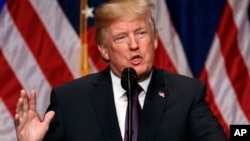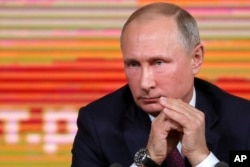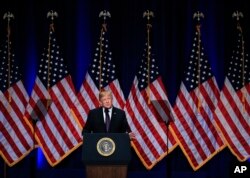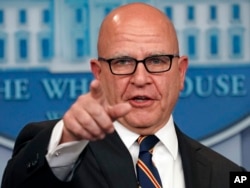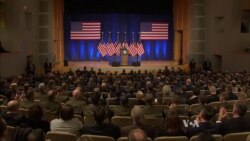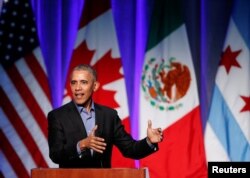Russia said Tuesday it sees U.S. President Donald Trump's new national security strategy as "imperial" and showing a lack of willingness to accept a multi-polar world.
Kremlin spokesman Dmitry Peskov said Russia disagrees with the view that it is a security threat for the United States, but welcomed the Trump administration's stated willingness to work together on mutual interests.
Trump unveiled his strategy Monday, warning the country's greatness is being challenged by rival powers and promising the United States would use "every instrument" at its disposal to ignite what he portrayed as an American awakening.
The document says the United States "will seek areas of cooperation with competitors from a position of strength, foremost by ensuring our military power is second to none and fully integrated with our allies and all of our instruments of power."
During a speech in Washington, Trump pointed to Russia and China as his chief concerns, saying both countries "seek to challenge American values, influence and wealth."
But he promised the United States, under his leadership, would not back down.
"Whether we like it or not, we are engaged in a new era of competition," Trump said, cautioning, "American success is not a foregone conclusion."
"We are declaring that American is in the game and that America is going to win," he said.
China's Foreign Ministry responded Tuesday, saying the United States should abandon its "Cold War mentality" and stop deliberately distorting China's intentions.
Trump said the new national security strategy, which he described as a return to the wisdom of the country’s founding fathers, would be a roadmap to greatness.
In recent days, senior officials had promoted the new strategy, 11 months in the making, as a "clear and actionable playbook" designed to take on growing threats by focusing on safeguarding U.S. vital interests.
"The global balance of power has shifted in unfavorable manners to American interests," a senior administration official told reporters during a White House background briefing Sunday. "This new strategy presents a plan of how America can regain momentum to reverse many of these trends."
Trump on Monday repeatedly criticized past U.S. leaders.
"They lost sight of America's destiny, and they lost their belief in American greatness," he said. "They surrendered our sovereignty to foreign bureaucrats in far away and distant capitals."
Confronting Rivals
In particular, Trump blamed previous U.S. administrations for failing to confront North Korea and its nuclear ambitions "when it was much easier to handle."
And Trump renewed criticism of former President Barack Obama for what he described as a "disastrous" nuclear deal with Iran.
"Pushing back rather than simply engaging adversaries is important. I do think that was a weakness in the past," said David Adesnik, director of research at the Washington-based policy institute Foundation for Defense of Democracies.
In his address Monday, the president insisted his administration’s efforts are already paying dividends from the Middle East and South Asia to North Korea and at home.
And while he described America’s rivals as both tough and tenacious, he said they could also become allies under the right conditions.
"We will attempt to build great partnerships with those [Russia and China] and other countries, but in a manner that always protects our national interests," Trump said.
The president pointed to Sunday’s phone call from Russian President Vladimir Putin, thanking the United States for sharing intelligence to thwart a terror plot, as a sign of success.
"That’s a great thing and the way it’s supposed to work," Trump said.
Other senior officials echoed the sentiment that under the principles of the new national security strategy, Washington’s relationship with Moscow had improved.
"We're certainly better off right now than we were several months ago," one official said. "But we still see a lot of areas where our interests just don’t align or directly conflict."
National Security Strategy
And top officials, like U.S. National Security Advisor Gen. H.R. McMaster, continue to voice concern about what they describe as Russia’s "sophisticated campaigns of subversion and disinformation."
The Trump national security strategy unveiled Monday aims to confront such threats by focusing on four vital national interests: protecting the homeland, promoting American prosperity, preserving peace through strength, and advancing American influence.
It proposes stronger controls along U.S. borders, increased restrictions on immigration, enhanced military spending, an improved national infrastructure designed to be resilient in the face of expected cyberattacks and stronger emphasis on fair trade and the protection of intellectual property.
WATCH: New security plan
Officials and analysts say elements of the new national security strategy, which some in the administration describe as "competitive engagement," have been increasingly evident in Washington’s approach on the international stage.
"I think we already have clear signs of this especially on the Russian front," said Nile Gardiner with the Washington D.C.-based think tank The Heritage Foundation.
"You’ve seen a significant increase in U.S. troop numbers in Eastern Europe especially the Baltic states. In Poland, for example, you now see the administration actively considering the idea of sending defensive weapons to Ukraine," Gardiner said.
U.S. emphasis
U.S. officials also seek to push back against the notion that President Trump’s campaign rallying cry of "America first," should be interpreted as "America alone."
"Our strategy emphasizes strengthening alliances," the president said Monday. "It recognizes that our strength is magnified by allies who share principles -- and our principles -- and shoulder their fair share of responsibility for our common security."
Yet some see this as an area in which the Trump administration could struggle, especially given the way the new strategy prioritizes and emphasizes U.S. economic interests, which Trump said would begin with "building up our wealth and power at home."
"Focusing on protection of American economic interests in a global marketplace painted with rivals, rather than partners, will discourage the use of multilateral trade agreements in a global economy marked by partnership," said Nicholas Glavin, formerly a researcher at the U.S. Naval War College's Center on Irregular Warfare and Armed Groups.
Glavin, who is currently studying at The Fletcher School of Law and Diplomacy at Tufts University, says that could actually weaken U.S. attempts to compete against key rivals on the word stage.
"Where Washington won’t lead, others will, most notably Beijing," he said. "In the long term, this hurts the U.S. much more than multilateralism in the global economy would."
Some former officials also fear that the administration, due in large part to the president’s rhetoric, is prone to self-sabotage, especially when it comes to one of its key goals – that of preserving the world order established at the end of World War II.
"By its actions, it has actually undermined U.S. leadership of the liberal international order," said former Deputy Assistant Secretary of Defense Michael Carpenter. "All of that has been downplayed in favor of a more realpolitik understanding that nations will pursue their own interests."
And there are some who doubt China, seen as a key rival, will respond well.
"Trump’s words are always illogical," said Shi Yinhong, the director of the U.S. Center at China People’s University in Beijing. "China doesn’t care much about what he says but what he does."
"His flattering China visit is pleasing to Beijing, but what concerns Beijing the most is the U.S. doesn’t touch Taiwan," Shi said.
Democratic values
There have also been concerns from former officials about what some see as a willingness to give up on the promotion of democratic values, a key component of U.S. leadership in previous administrations.
The president rejected such notions in his speech.
"America will lead again," Trump said. "We do not seek to impose our way of life on anyone but will champion the [democratic] values without apology."
Another area where the new national security strategy departs dramatically from the previous administration's strategy is climate change.
Obama’s 2015 strategy also called on the U.S. to confront "the urgent crisis of climate change."
The Trump national security strategy does not.
"Climate change is not identified as national security threat," said a senior administration official. "The importance of the environment and environmental stewardship are discussed."




